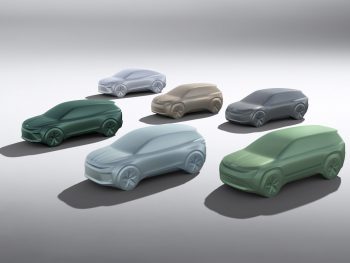Škoda to launch six new EVs by 2026 in accelerated e-mobility offensive
Škoda is to roll out six new battery electric vehicles (BEVs) by 2026, significantly expanding and diversifying its all-electric line-up.

The six-strong BEV line-up will include four all-new models along with the revised Enyaq iV and Enyaq Coupé
The planned arrivals include four all-new BEVs along with two updated Enyaq iV family models, supported by investment of €5.6bn (£5bn) in e-mobility by 2027.
The first to arrive will be the Elroq, due in 2024 and providing an all-electric successor to the current Karoq compact SUV. Measuring around 4.50 metres in length, it will deliver a similar combination of compact dimensions and a spacious, very practical interior as the Karoq.
Next up is an entry-level hatchback, codenamed ‘Small’, due in 2025 and effectively replacing the former Citigo-e. It will provide a sister model to VW’s planned ID.2 and is likely to share the same VW Group MEB Entry platform and many parts. As with the VW, it’s also pitched for a €25k (£22k) starting price. It will be produced at a Volkswagen Group Plant in Spain and at around 4.10 metres in length, it will offer a similar luggage capacity as the Scala.
Also due mid-decade are the revised Enyaq iV and Enyaq Coupé iV – which will get a comprehensive update in a midlife refresh. This includes adopting the new Modern Solid design language, which was first showcased on the Vision 7S concept and is a key feature of all the new BEV models.
A fully electric estate model is due in 2026 – “taking the strengths of this particularly popular and successful Škoda body style into the electric age”. For fleets, it will provide further choice in a sector currently only served by the MG5 EV and with the Peugeot e-308 SW and Vauxhall Astra Sports Tourer due in the second half of this year and the BMW i5 Touring expected in 2024.
The largest of Škoda’s future BEVs will be the ‘Space’ seven-seater SUV – the production version of the Vision 7S concept shown last year. It will be around 4.90 metres long and will round off the upper end of the portfolio.
However, while the Czech carmaker is rapidly building out its BEV line-up, it’s also emphasised that cars with internal combustion engines and plug-in hybrid powertrains will continue to be a mainstay of its model portfolio over the course of the transition phase to e-mobility.
As such, its plans include a new, fourth generation of the flagship Superb and second generation of the Kodiaq SUV this autumn, including latest petrol and diesel engines, as well as plug-in hybrid variants. Meanwhile, the Octavia, Kamiq and Scala will be facelifted shortly.
The brand said the strategy is to offer the most diverse portfolio in its history: “combining the best of both worlds and offering customers in different markets the right Škoda for every taste and requirement”.
Klaus Zellmer, Škoda chairman, commented: “With six new all-electric models across all segments by 2026, Škoda Auto is moving even faster towards sustainable, electric, individual mobility. Together with our new and highly efficient conventional and hybrid-powered models, we are offering the best of both worlds – meeting our existing and new customers’ needs around the globe in this time of transition.”
Škoda plans for sustainability also include a focus on renewable energy and recyclable materials, along with 100% CO2-neutral production in the brand’s Czech plants by 2030 and a second life for its used EV batteries in stationary energy storage systems.

